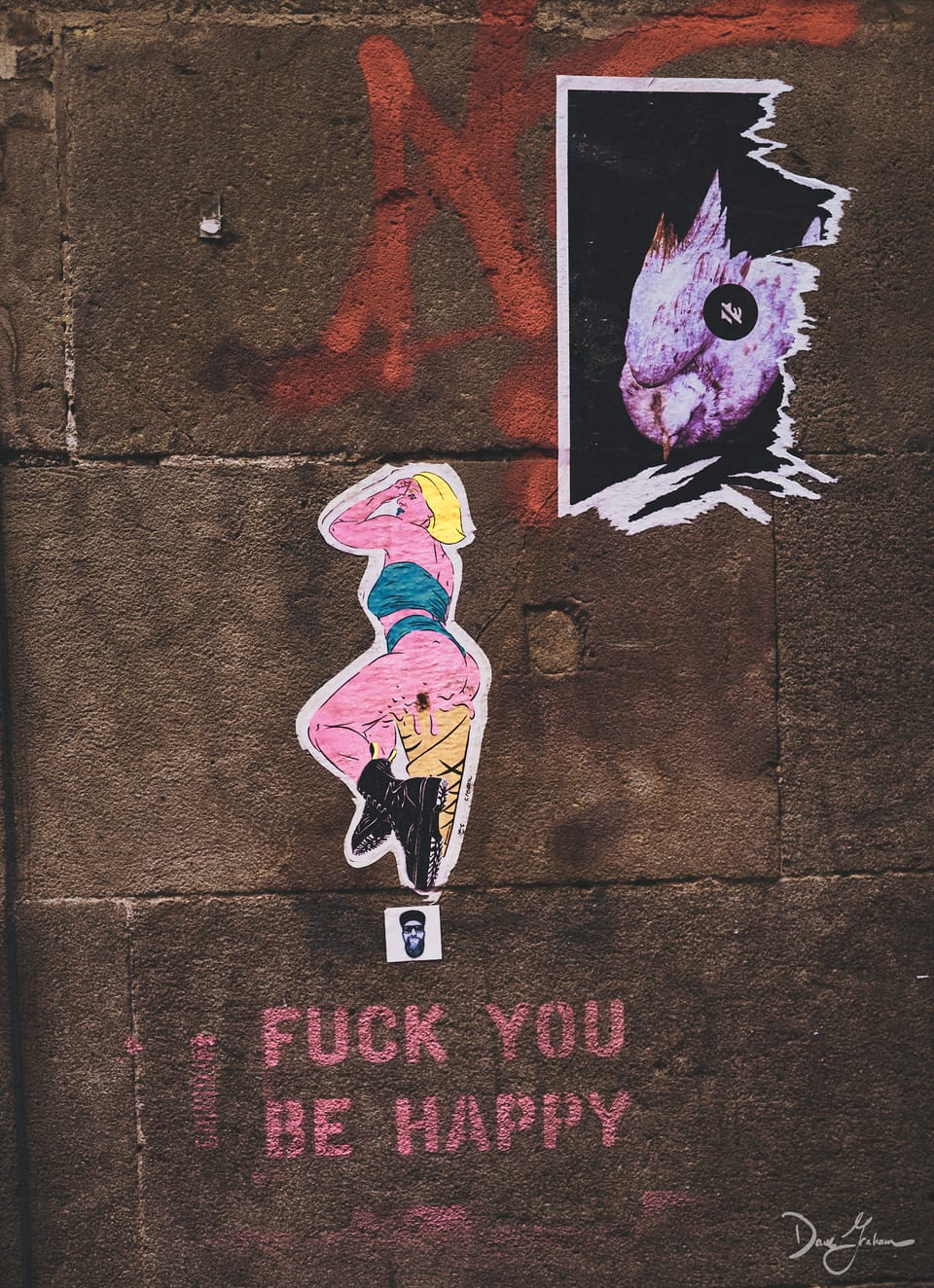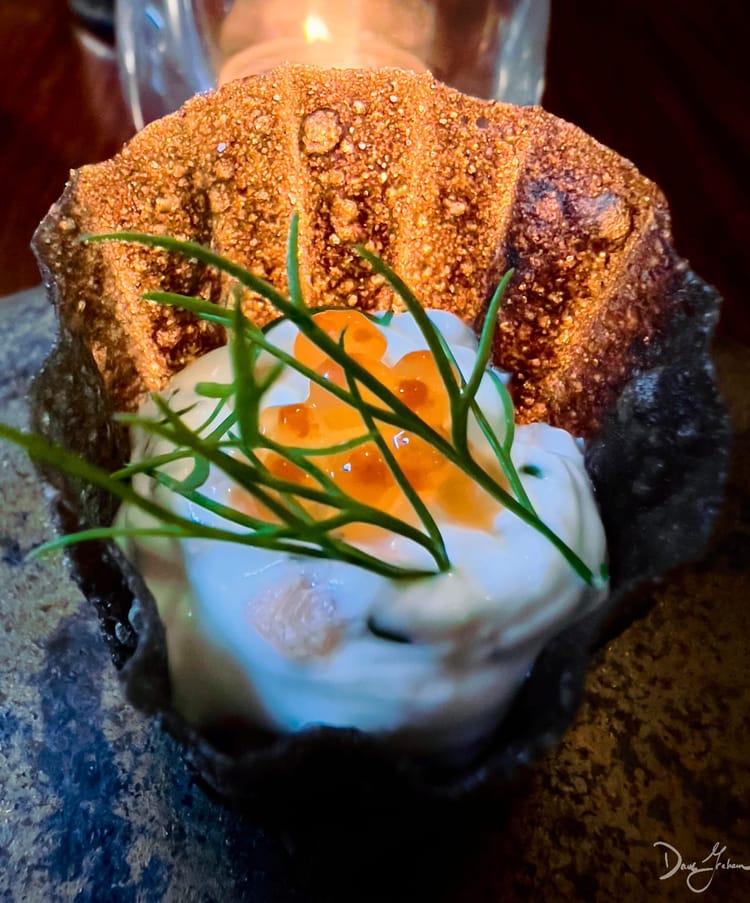Fuck You, Be Happy

On the joys of separation, leaving, and moving on
I've had this image in my collection for quite some time now, and it’s never quite found its place within the widening gyre of my portfolio. It’s brash, coarse, not given over to the politeness of conversation for many reasons, and, in a very tangible sense, it’s designed to upset the delicate balance of aesthetics and appreciation. It feels a bit like me, in other words, in the various stages of composure and self-discovery.
Having written hundreds of thousands of words in the last few decades of my life about the challenges of “becoming” and “being” and all of the Maslowian self-actualisation stuff, I’ve found that as I’ve grown older, the need for introspection, challenge, and change has become almost an unguent to my life. Simply slapping words together in AI-displaced drivel doesn’t capture the compulsion to write, to explain, to didact as much as these fingers pressed to keys do. I’d go so far as to say that the changes I’ve made in my life have forced more direct introspection and interface with my soul than ever before, and that’s what leads to today’s post.
Slightly more than a year ago, I made two changes: I left a position at one of the world’s largest information technology companies, and I placed my pursuit of a PhD on extended pause. In the intervening times, I’ve returned to a place of understanding that the PhD might end up being a necessary salvation (more on that in 2026, I suppose). Still, the moral and ethical concerns I had about leaving my previous employer were not alleviated by my role in a smaller, more agile technology company. Indeed, the refining press of humanity and velocity pointed to even further patterns of personal growth that were needed: more understanding, compassion, and a grounded moral/ethical backbone.
The complexities of this rat-race of artificial intelligence generally involve the understanding and realisation, at some point or another, that to fully embrace it, you must give away some aspect of your character. You must understand that the pursuit of it doesn’t negate its net benefit to society, so long as the foundation upon which it is built doesn’t take for granted the blood, sweat, and tears of humanity upon which it takes form.
Technology isn’t amoral; it relies on the understanding of impugnment, of investiture, of conscious beneficence from humanity to an aetherial construct. It depends upon the will of the many to embody the ways and means of communication, development, and progress. However, in all of this, it strips the core of who we are, exploiting our creativity, progress, and joie de vivre, all for the sake of artificial exchange, a currency of the elite.
As noted, you give away some aspect of your character to partake in this pursuit. If you don’t give away your soul, you give away your choice, your morals, your ethics, if you choose to look the other way at what is being done. If you decry regulation and yet moan about the loss of income to those “damn AIs!” you’re no better than the people to whom an algorithm is just maths. The point is, you’re complicit in what is being made, formulated, and foisted, whether you like it or not.
I’m not a Luddite. I believe that there is an inevitable and necessary tension between how society “becomes” and how it maintains its homeostasis. I believe in the underlying principles of agonism, activism, and conflict. In essence, I believe that class warfare exists across any dimension, not just economic, because, in the end, the inevitability of who and what we are has never been decided by those to whom it means the most; it’s defined by the despots, the egomaniacs, the dictators, and the kings. It’s decided by the oppressors, not the oppressed; the abusers, not the victims.
It’s time for a change.
I resigned today from the venture I embarked upon last year, in no small part because I found myself at odds with the very ontologies that drove me from the previous employer. The permutations were different, but no less significant: a moral and ethical complacency with the status quo (amongst other things that don’t merit mention at this time). I will stress this: this is my personal choice, and I don’t place the decision or the weight and reasons behind it on anyone else.
To exist in this space is to exist in the very nexus of conflict between humanity’s next cycle or turn of the wheel (with apologies to Robert Jordan). To wrestle with the who, what, when, where, and how of our supposed agentic revolution is one of the most extraordinary things we can do for ourselves because it forces us to confront our fears, failures, and fuckups. Hopefully, after these moments of introspection, we come to the realisation that we’re more than cogs in a greater machine; that we’re more capable of affecting change and the course of humanity than we are being the unwitting recipients of it. We need to understand our agency and abilities and fight against the oligarchical embodiments of so-called “human progress” to be more than just employees or benefit numbers.
My decision to leave came about because I wanted to wake up each day being more human, not less. I wanted not to sear my soul and conscience with the branding iron of Muskian technofascism underpinned by the cowardice of complacency. The greater evil is not challenging the presupposition that we have no agency or choice, and to continue to supply, develop, and support those who undermine the very fabric of who and what we are.
I’m an insignificant person amongst the world’s billions. I’m given over to fits of passion and purpose, complacency and comeuppance. I’ve grown old and fat on the largess of the elite whom I decry time and again. Like any acknowledged addict, I’m gradually withdrawing myself from my source, my supply, my dealer, and finding ways to substitute the unhealthy habits and proclivities for the things that bring life, joy, and purpose. I hope that, with these decisions, I’m choosing happiness, as well as purpose and meaningfulness. Time will tell as it always does, and I imagine that, in the years ahead, we’ll have additional conversations around discovery, agency, and agonism. But let’s cross that bridge, sit by that fire, and talk when we get there.
“Fuck you, be happy.” It’s brash, coarse, egocentric, and apropos. And it’s more meaningful than ever in these times.
May it ever be so.





